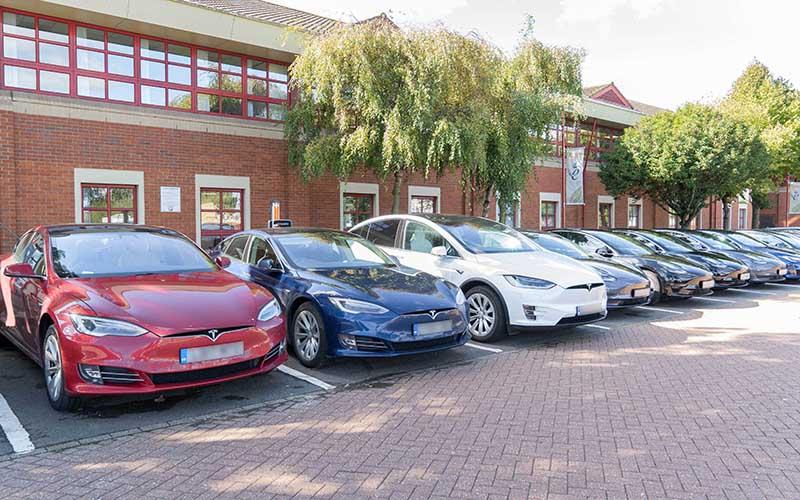
Ground Control invests in 32 Tesla vehicles
BALI Registered Contractor member Ground Control, one of the UK’s largest and most successful grounds maintenance, commercial landscaping and external solutions providers, has today officially unveiled a significant investment in a fleet of 32 Tesla Model 3 electric vehicles (EVs), taking the total number of Tesla EVs in the company’s fleet to over 40. The investment is part of its company-wide environmental strategy, and one that will eventually see all of Ground Control’s 100 company cars transition to electric vehicles over the next 12 months.
Says Simon Morrish, CEO, Ground Control:
“A strong commitment to the environment, and playing our part in protecting it, has always been a core guiding principle at Ground Control, so we are extremely pleased to have achieved another milestone in this regard with our investment in 32 Tesla Model 3 electric vehicles.”
Morrish states the commercial priorities for Ground Control when it started to look at transitioning its company vehicle fleet were:
1) it needed to ensure employees were no worse off – either financially or in terms of the quality and performance of the vehicle itself;
2) the business needed to be as close to cost-neutral itself as a result of the investment;
3) there should be no loss of productivity across the business.
“I’m very proud and pleased to say that initial indications are we have secured all three, which in my mind makes this investment a major commercial and environmental success story for us.”
“With the launch of the Tesla Model 3, the economic benefits are too compelling to ignore,”
he continues.
“The business is cost-neutral in comparison to investing in a fleet of diesel or petrol cars over the lifetime of each vehicle, when the total cost of ownership is measured against that of a combustion engine car and its fuel, servicing, road tax and so on. And, importantly, the take home pay of Ground Control employees using the vehicles will rise in 2020 due to the introduction of a ‘Zero benefit in kind’ tax system, ensuring they don’t ‘lose out’ financially from their transiting to an EV.”
In terms of the Model 3’s performance and range, Mr Morrish says employees are extoling the virtues of both. The Long Range Model 3 offers up to 348 miles on a single charge. As over 95 percent of the journeys the Ground Control employees undertake every day for work fall within this range; they generally don’t have to charge again during the day; just top up at the ChargePoint Station at work or fully charge at home in the evening. The Tesla Model 3s also have a 5-Star Euro NCAP safety rating, putting them right at the top of the safest cars on the market today and ensuring Ground Control employees have maximum safety when driving.
“The traditional mantra of business that ‘going green costs money’ is now redundant,” continues Simon. “Across the board, green technologies and renewable energies have reached a commercial and technological tipping point, where the economics and the performance in many instances are more compelling than an incumbent technology or fossil fuel. ‘Notgoing green now costs money’ and this message needs to be spread more widely and with more momentum throughout the business community.”
In addition to the Tesla vehicles, the majority of which arrived at Ground Control in September, the company has also installed a number of charging stations at its Billericay HQ, supplied by EV charging pioneer, ChargePoint, and is in the process of converting its commercial energy supplier to one that provides renewable energy. Ground Control has also worked with each employee who has a Tesla Model 3 to help them convert their home energy provider to one who draws its energy from renewable resources, such as Bulb.
Continues Morrish:
“In my mind there is little point investing in a fleet of EVs if the majority of the power used to charge them on a daily basis comes from non-renewable resources, so this whole package completes the circle – EVs recharged by renewable energy sources.”
The next step for the business is to continue the process of moving its vans, trucks and tools over to more environmentally sustainable alternatives as these become commercially available and the environmental credentials of each ‘stack up’. He continues:
“It’s not an overstatement to say we have an existential crisis occurring in our lifetime when it comes to the environment and everyone - from individuals, to business, regional organisations, governments and nations - have a role to play in addressing the environmental issues we have across the globe.
“However large or small the environmental effort you make is, it all contributes to the collective good – a ‘good’ we desperately need. In this regard, I would urge other companies to also do the right thing to see where and how they can convert to green technologies or providers of renewable energy – and as it now also makes strong commercial sense, why would you not want to help the environment and help your business?”
concludes Morrish.
